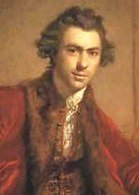As I want him to gradually develop enough feeling for this man he's never known to want to avenge his death, it is important that he gain some sense of him. So in the course of visiting an old friend of his father's, Archie will see a set of miniatures painted in about 1676, when his father would himself have been nineteen - and on the Grand Tour with his friend Ervin.
It was customary for young men to have themselves depicted in full classical antic mode, with ruined columns, rent curtains, toga-type gowns and bits of armour. I wouldn't imagine - no matter what the skill of that year's modish artist - that it was always easy to make a young man look good like this:

(Nicholaes Maes, Portrait of a Young Man, 1676)
But for every ten chaps who looked a bit burkish, there was always one who managed to look cool no matter what get-up he was shown in:

(Unknown artist, John Wilmot, 2nd Earl of Rochester, c. 1665-75)



























